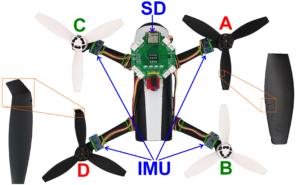We are very proud to announce that SkyEye Team won the third place of the Grand Challenge in the Mohamed Bin Zayed International Robotics Challenge MBZIRC2020 that took place in February 2020 in Abu Dhabi.

Acoustic dataset for UAV rotor anomaly detection
Data-driven Fault Detection and Isolation (FDI) systems receive a lot of attention from researchers. Several recent applications utilize acoustic signals recorded on-board of the Unmanned Aerial Vehicle (UAV) to assess the condition of propulsion system and diagnose rotor blade impairments. In this work, we propose two major improvements to the previously developed FDI scheme. They are aimed at reducing the computational load of the deep LSTM-based (Long Short-Term Memory) fault classifier. First, the PCA-based (PrincipalComponent Analysis) feature space reduction allows reducing the size of neural networks and thus decreasing the number of mathematical operations. Secondly, a modified algorithm introduces an ensemble of multiple weak classifiers with a decision-fusion strategy that provides the final status of the system. The developed schemes were evaluated in comparison to the original algorithm, using an extensive dataset of real-flight acoustic data. The results show that the proposed improvements significantly reduce the computation time within the assumed performance constraints. LINK

PADRE – Propeller Anomaly Data REpository for UAVs various rotor fault configurations
The article presents a drone sensory database collected during flights with different types of propeller failures. Measurements from four accelerometers and four gyroscopes were collected during 20 flights with two types of faults occurring in different configurations in one, two, three or four rotors. The paper shows the architecture of the system and the procedure for acquiring and processing the data. Raw sensor outputs, pretreated data, and digitally processed signals were provided in a publicly available repository, the structure and purpose of which are discussed in the paper. The applicability and potential use of the shared data for other research are indicated. The provided repository should be helpful in developing methods for detecting and classifying faults in actuators of unmanned aerial vehicles (UAVs). It will be particularly useful for researchers working on data-driven methods. The default purpose of the dataset is to train artificial intelligence models that require large amounts of data. LINK
